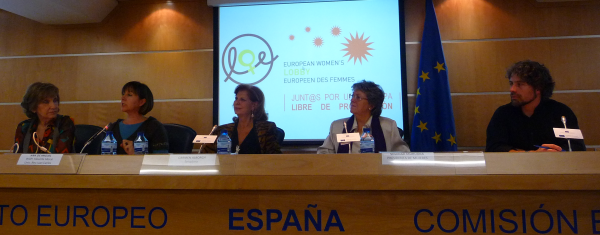Spain - EWL members put prostitution on the political agenda

[Madrid, 20 December 2012] The EWL national coordination in Spain, CELEM, organised on Thursday 20 December a conference dedicated to the issue of prostitution, in the European Parliament Office in Madrid. In a context of divergent approaches in Spain, with on the one hand local campaigns targeting sex buyers (Madrid, Sevilla), and on the other hand the recent opening of prostitution schools (Valencia), it was urgent for Spain to launch a political debate and propose a public event to learn more about the reality of prostitution and the political context in Europe. In an introduction to the conference, the key question raised by Rosa Escapa Garrachon, President of CELEM, which served as a guideline for the panels, was: “Waht kind of society do we want to hand down to the future generations?”

MEP Iratxe Garcia Perez stressed the key role of politics to bring about change in society, and denounced the use of the crisis or of the levels of competence by Member States to reject the discussion of key issues at EU level. She welcomed the decision of the European Parliament’s Committee on Women Rights to work in 2013 on an own-initiative report on prostitution and sexual exploitation, and their impact on gender equality.
The first panel of the event comprised researchers and professionals working on the issue of prostitution. Academic Ana de Miguel developed her arguments on prostitution as a “school for human inequality” (read her full article here). She explained that we face two main obstacles when discussing and conceptualizing the issue of prostitution: the false glamorous image of prostitution conveyed by the media and perpetuating patriarchal values; the issue of ‘consent’ which is used as a criterion whereas it shouldn’t be consdered in societies based on inequalities. She shared her own definition of prostitution: an institution which guarantees to men access to women’s body, in a regulated, collective and paid manner. She alerted on the normalization of prostitution, which perpetuates inequalities between women and men.
Then, Soledad Muruaga talked about the impact of prostitution on women’s health, based on her expertise and experience with the NGO Mujeres para la Salud and their analysis of ‘patriarchal sexuality’. Rocio Nieto presented the work of her NGO Apramp, which supports and assists women in prostitution in Spain. Finally, Erick Pescador talked about the perspectives of men on the issue, as he is a representative of the NGO Hombres por la Igualdad.
The second panel aimed at looking at political approaches in Spain and Europe. EWL Policy Officer Pierrette Pape gave facts and figures about the two models that are often compared in the debate on prostitution: ten years after the implementation of the Dutch and Swedish models, outcomes show that the Swedish system succeeded in reducing prostitution and protecting women, while the Dutch system attracts more traffickers and sees more illegal prostitution. She also presented the recent developments in other countries, and showed examples of campaigns targeting the sex buyer in Spain and France, some of them being the result of a very fruitful collaboration between the local authorities and the NGOs. See her presentation here.
French parliamentarian Ségolène Neuville, from the French socialist party, was invited to present the legal context and development in France and to explain the recent French abolitionist positioning on prostitution. Using the outcomes of a very new report of the French Department for Social Affairs on prostitution and health (‘Prostitution: les enjeux sanitaires’), she illustrated the intrinsic nature of prostitution as a form of violence against women, quoting detailed reports of doctors about the health situation of women affected by prostitution.
She then presented the first outcomes of a study she commissioned from two sociologists in France, looking at the impact of the Spanish brothels on young French people living at the border with Spain. For those young people, the border is a no-law zone where everything is possible and where everything can be bought and sold, including women. Going to the brothels in La Junquera seems to form part of building one’s masculinity and becomes a normalised activity. At the same time, this situation has a very negative impact on young women, who are pressured to look very sexy, as they are often compared to the prostituted women by the young men, who use blackmail in their relationships to get more pornified sexual acts.
Finally, Carmen Quintanella and Susana Ros Portavoz, both parliamentarians in the Equality Committee of the Spanish Parliament, gave the opinion of their political party (PP and PSOE) on the issue of prostitution and the possible ways forward in Spain.
As first concluding words, Pierrette Pape presented the Brussels’ Call ‘Together for a Europe free from prostitution’, which has been signed by 200 organisations from 25 EU countries, and call on the Member States and the EU to implement holistic and integrated policies based on the recognition of prostitution as a form of violence against women and an obstacle to equality between women and men. Only two Spanish NGOs and one Spanish MEP have signed the Call yet, and the EWL hopes that more will join the European abolitionist movement. Pierrette Pape recalled the importance of always addressing the issue of prostitution, even when discussing trafficking, and using human rights as ground for the abolition. Abolition is a political project, with a strong long-term progressive objective, which should know no political boundaries, as the support to EWL campaign already shows, with the support of more than 36 MEPs from all political groups in the EP. See the presentation of EWL campaign and the Brussels’ Call here.
To conclude, Dominique Duarte, EWL Board Member, answered to the initial question of the event: "Real equality cannot wait. We all have a role to play." CELEM’s contribution was very important with this conference, and it’s now up to Spanish society and decision-makers to take up the challenge.





